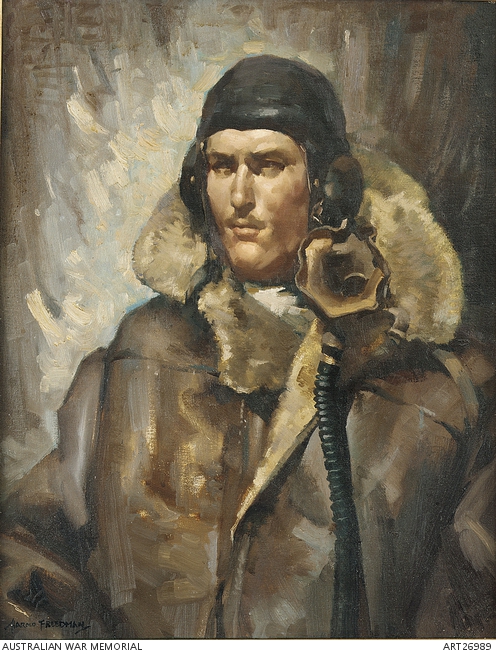Decisive Action: Pilot Officer Rawdon Middleton
Portrait of 402745 Flight Sergeant (later Pilot Officer) Rawdon Hume Middleton VC, RAAF, attached to No. 149 Squadron RAF.
Rawdon Middleton enlisted in the Royal Australian Air Force (RAAF) during the Second World War and, after training, was posted to a Royal Air Force (RAF) squadron in England. On 28 November 1942 he set out on a bombing raid over Italy. The story of this flight, his 29th operation over enemy territory, gives an insight into the crucial decisions leaders are required to make in wartime.
Even before Middleton and his crew reached their target in Italy, they realised that the climb over the Alps had used too much fuel. Middleton had to make a decision: follow his orders to bomb the Fiat factory in Turin or return to base in England. Middleton chose to continue with the bombing mission.
During the bombing run his aircraft was struck by anti-aircraft fire. A shell exploded in the cockpit between Middleton and his second pilot, and both men received serious injuries. Middleton lost consciousness and his co-pilot took control of the plane, preventing a crash and then releasing the bombs.
Middleton’s right eye had been blown out and he had difficulty seeing, moving and speaking. Nonetheless, when he came to, he took back the controls. As they began the return flight, Middleton instructed the crew to jettison everything they could – including guns, ammunition, seats and the fire extinguisher – to reduce the weight of the plane and improve their chances of reaching England.
Middleton was an outstanding pilot but his injuries and the damage to his aircraft made the return flight both dangerous and slow. The aircraft was again hit by anti-aircraft fire over the French coast and, according to one of his crew, ‘Middleton was an artist at throwing a bomber about, and we lost height from 6000 to 600 feet’.
After they flew clear of the gunfire, Middleton told the crew:
We will try to make our coast and you fellows can then bale out and save yourselves – I cannot get away with my wounds anyway
Middleton (on the right) at the Elementary Flying Training School at Narromine NSW, with four other student pilots. Middleton completed his training with the Empire Air Training Scheme in Australia, Canada and the United Kingdom.
He then asked that his parachute be placed beside him. When they reached the English coast, with only enough fuel to fly for a further five minutes, Middleton instructed the crew to bail out before he flew back over the English Channel to avoid crash landing the plane in a populated area. Five of the crew landed in England, but the two who stayed on board to assist their pilot drowned after they jumped from the aircraft. Middleton remained in the cockpit and his body washed up on the English coast two months later.
Portrait of Flight Sergeant Rawdon Hume Middleton VC, RAAF wearing B-type flying helmet, oxygen mask and Ervin jacket.
The wireless operator on the flight, Norman Skinner, later recalled:
During the return home there were many opportunities for us to abandon the aircraft over France, and for Middleton to live. But he preferred that we, his crew, and the aircraft of which he was Captain, should not fall into enemy hands. That was the kind of man he was …
Middleton was posthumously awarded the Victoria Cross (the highest military award in the British Empire) for his actions on 28–29 November 1942.
He was the first member of the RAAF to be awarded the Victoria Cross. The citation for the award reads:
While all the crew displayed heroism of high order, the urge to do so came from Flight Sergeant Middleton whose fortitude and strength of will made possible completion of the mission.
This article was originally published in our Education Publication: Decision.


